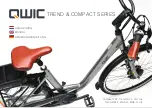
I General User Manual
43
Avoid operating the back-pedal brake continuously on
long descents as the internal components of the brake
system can become extremely hot which reduces brak-
ing performance. On long steep descents, always al-
ternate between the rear wheel brake and the second
brake (front wheel brake) to allow the rear wheel
brake to cool down. As the brake drum can become
extremely hot when braking for prolonged periods,
you should not touch it for at least 30 minutes after
riding.
Brake drum
21.3.2 Back-pedal brake
With back-pedal brakes the braking force is transmitted
by the foot via the chain to the brake system. If applied
continuously for an extended period, back-pedal brakes
become very hot. This reduces the braking performance
and can result in complete failure of the brake. You should
adapt your handling accordingly.
The back-pedal brake is operated by pedalling back-
wards. The force applied by the back-pedal brake
varies depending on the position of your feet/pedals.
If the crank arms are vertical, i.e. one of your feet is
in the highest position and the other is in the lowest
position, you cannot brake hard. Move the crank arms
into a horizontal position if you think you may want/
have to brake.
The back-pedal brake is easy to apply in a controlled
manner. The maximum braking performance is only
reached after a certain run-in period.
Operate the back-pedal brake carefully to familiarise
yourself with it and get a feel for its retarding effect.
If you have not used your bike for a while, there may
be surface rust in the brake drum which can increase
the braking force. If you have not used your bike for
some time, you should brake gently several times
when riding off to remove the surface rust. This pre-
vents sudden blocking of the brake.
If excessive overheating of the hub occurs, this can
lead to loss of lubricant and a sharper braking effect.
In these cases, have the brake checked by a profes-
sional bike workshop.
















































